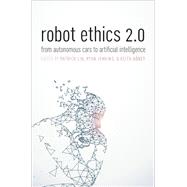Robot Ethics 2.0 From Autonomous Cars to Artificial Intelligence
, by Lin, Patrick; Abney, Keith; Jenkins, Ryan- ISBN: 9780190652951 | 0190652950
- Cover: Hardcover
- Copyright: 10/3/2017
Patrick Lin, Ph.D., is a philosophy professor and director of the Ethics + Emerging Sciences Group at Cal Poly. He is also affiliated with Stanford Law School, Notre Dame, and World Economic Forum; and previously with Stanford's School of Engineering, U.S. Naval Academy, and Dartmouth. On the ethics of emerging technologies, he has provided counsel to the U.S. Dept. of Defense, United Nations, Google, Apple, and many other government and industry organizations.
Ryan Jenkins, Ph.D., is an assistant professor of philosophy and a Senior Fellow at the Ethics & Emerging Sciences Group at California Polytechnic State University, San Luis Obispo. He focuses in normative ethics (especially consequentialism) and applied ethics, including military ethics and emerging technologies such as driverless cars, robots, and autonomous weapons.
Keith Abney, A.B.D., is senior lecturer in the Philosophy Department and a senior fellow at the Ethics + Emerging Sciences Group at California Polytechnic State University, San Luis Obispo, with research that includes work on demarcating science from non-science, moral status and sustainability, astronaut and space bioethics, patenting life, human enhancement, just war theory and the use of autonomous weapons, robot ethics, and other aspects of the ethical implications of emerging sciences and technologies
Preface
I. Moral and Legal Responsibility
1. Autonomous Vehicles and Moral Uncertainty Vikram Bhargava and Tae Wan Kim
2. Ethics Settings for Autonomous Vehicles Jason Millar
3. Autonomy and Responsibility in Hybrid Systems: The Example of Autonomous Cars Wulf Loh and Janina Sombetzki
4. Imputing Driverhood: Applying a Reasonable Driver Standard to Accidents Caused by Autonomous Vehicles Jeffery K. Gurney
5. Liability Law for Present and Future Robotics Technology Trevor N. White and Seth D. Baum
6. Skilled Perception, Authenticity, and the Case Against Automation David Zoller
II. Trust and Human-Robot Interactions
7. Could a Robot Care? It's All in the Movement Darian Meacham and Matthew Studley
8. Robot Friends for Autistic Children: Monopoly Money or Counterfeit Currency? Alexis Elder
9. Pediatric Robotics and Ethics: The Robot Is Ready to See You Now, But Should It Be Trusted? Jason Borenstein, Ayanna Howard, and Alan R. Wagner
10. Trust and Human-Robot Interactions Jesse Kirkpatrick, Erin N. Hahn, and Amy J. Haufler
11. White Lies on Silver Tongues: Why Robots Need to Deceive (and How) Alistair M. C. Isaac and Will Bridewell
12. "Who's Johnny?" Anthropomorphic Framing in Human-Robot Interaction, Integration, and Policy Kate Darling
III. Applications: From Love to War
13. Lovotics: Human-Robot Love and Sex Relationships Adrian David Cheok, Kasun Karunanayaka, and Emma Yann Zhang
14. Church-Turing Lovers Piotr Botu
15. The Internet of Things and Dual Layers of Ethical Concern Adam Henschke
16. Challenges to Engineering Moral Reasoners: Time and Context Micha Klincewicz
17. When Robots Should Do the Wrong Thing Brian Talbot, Ryan Jenkins, and Duncan Purves
18. Military Robots and the Likelihood of Armed Combat Leonard Kahn
IV. The Future of AI and Robotics
19. Testing the Moral Status of Artificial Beings, or "I'm Going to Ask You Some Questions" Michael LaBossiere
20. Artificial Identity James DiGiovanna
21. Superintelligence as Superethical Steve Petersen
22. Artificial Intelligence and the Ethics of Self-Learning Robots Shannon Vallor and George Bekey
23. Robots and Space Ethics Keith Abney
24. On the Unabomber and Robots: The Need for a Philosophy of Technology Geared Toward Human Ends Jai Galliott
Biosketches
The New copy of this book will include any supplemental materials advertised. Please check the title of the book to determine if it should include any access cards, study guides, lab manuals, CDs, etc.
The Used, Rental and eBook copies of this book are not guaranteed to include any supplemental materials. Typically, only the book itself is included. This is true even if the title states it includes any access cards, study guides, lab manuals, CDs, etc.
Digital License
You are licensing a digital product for a set duration. Durations are set forth in the product description, with "Lifetime" typically meaning five (5) years of online access and permanent download to a supported device. All licenses are non-transferable.
More details can be found here.






